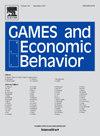带有主观可分性的公平除法
IF 1
3区 经济学
Q3 ECONOMICS
引用次数: 0
摘要
经典的公平分配问题假设要分配的资源要么是不可分的,要么是不可分的,或者是两者的混合,但代理总是对资源的可分割性有一个预定的、无争议的协议。在本文中,我们提出并研究了一个新的公平分配模型,在这个模型中,代理人对被分配的商品有自己的主观可分性。也就是说,一些代理人可能会发现一种商品是不可分割的,只有当他们收到整个商品时才会得到效用,而另一些代理人可能会认为同一种商品是可分割的,因此可以根据他们收到的商品的一部分提取效用。我们研究了当主体具有主观可分性时可以实现的公平性属性。首先,我们考虑了最大共享(MMS)保证,并表明在n≥2个代理的情况下,最坏情况下的MMS近似保证最多为2/3,并且在2个和3个代理的情况下,这个比例很紧。这与涉及两个或三个代理的经典公平分配设置形成对比。我们还给出了一种算法,该算法为任意数量的代理生成1/2-MMS分配。其次,我们研究了嫉妒自由松弛的层次结构,包括EF1M、EFM和EFXM,它们按强度递增排序。虽然EF1M与不浪费(一种经济效率概念)是相容的,但EFM的情况并非如此,甚至对于两种代理也是如此。然而,如果最多丢弃一种商品,则两个代理总是存在EFXM和非浪费分配。本文章由计算机程序翻译,如有差异,请以英文原文为准。
Fair division with subjective divisibility
The classic fair division problems assume the resources to be allocated are either divisible or indivisible, or contain a mixture of both, but the agents always have a predetermined and uncontroversial agreement on the (in)divisibility of the resources. In this paper, we propose and study a new model for fair division in which agents have their own subjective divisibility over the goods to be allocated. That is, some agents may find a good to be indivisible and get utilities only if they receive the whole good, while others may consider the same good to be divisible and thus can extract utilities according to the fraction of the good they receive. We investigate fairness properties that can be achieved when agents have subjective divisibility. First, we consider the maximin share (MMS) guarantee and show that the worst-case MMS approximation guarantee is at most 2/3 for agents and this ratio is tight in the two- and three-agent cases. This is in contrast to the classic fair division settings involving two or three agents. We also give an algorithm that produces a 1/2-MMS allocation for an arbitrary number of agents. Second, we study a hierarchy of envy-freeness relaxations, including EF1M, EFM and EFXM, ordered by increasing strength. While EF1M is compatible with non-wastefulness (an economic efficiency notion), this is not the case for EFM, even for two agents. Nevertheless, an EFXM and non-wasteful allocation always exists for two agents if at most one good is discarded.
求助全文
通过发布文献求助,成功后即可免费获取论文全文。
去求助
来源期刊

Games and Economic Behavior
ECONOMICS-
CiteScore
1.90
自引率
9.10%
发文量
148
期刊介绍:
Games and Economic Behavior facilitates cross-fertilization between theories and applications of game theoretic reasoning. It consistently attracts the best quality and most creative papers in interdisciplinary studies within the social, biological, and mathematical sciences. Most readers recognize it as the leading journal in game theory. Research Areas Include: • Game theory • Economics • Political science • Biology • Computer science • Mathematics • Psychology
 求助内容:
求助内容: 应助结果提醒方式:
应助结果提醒方式:


